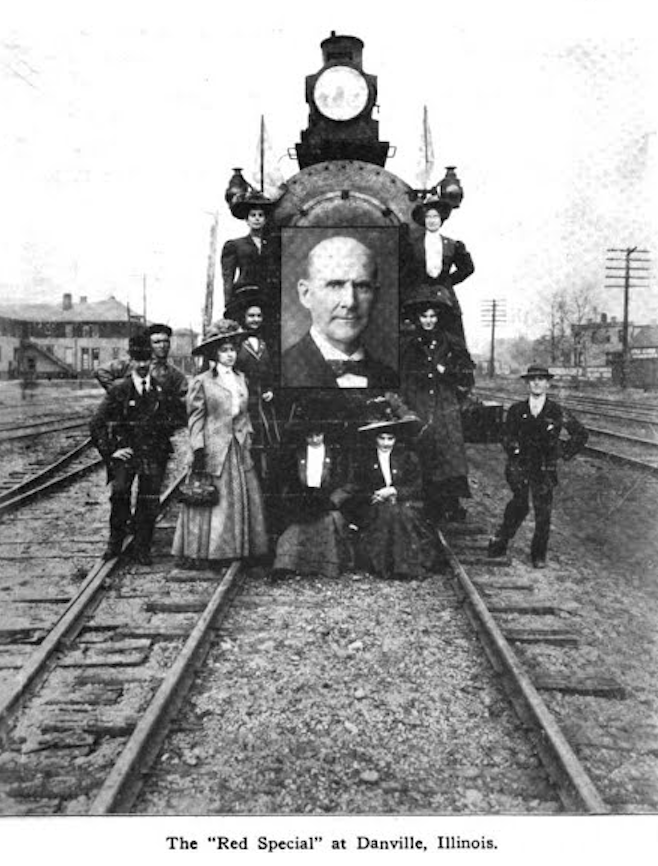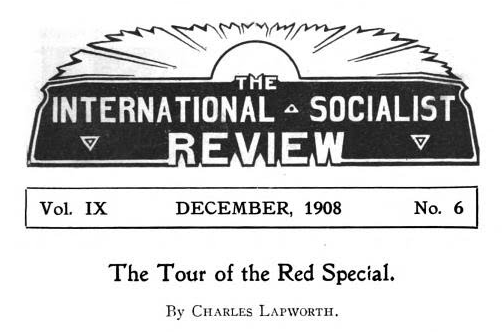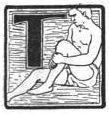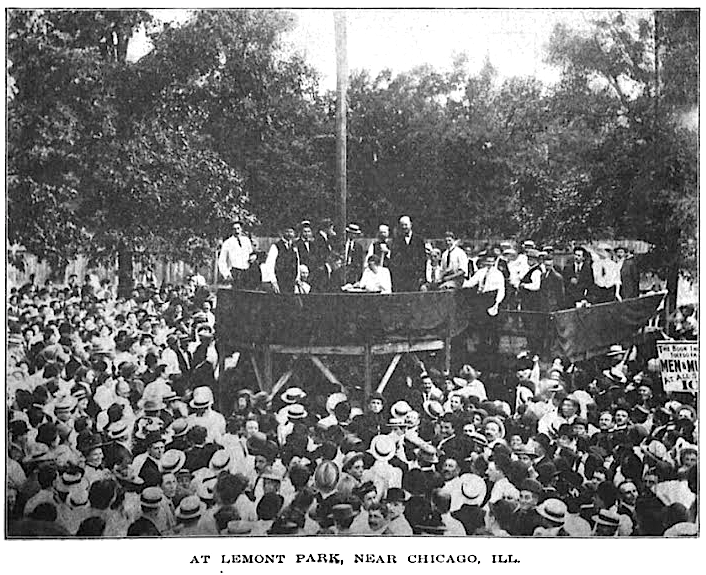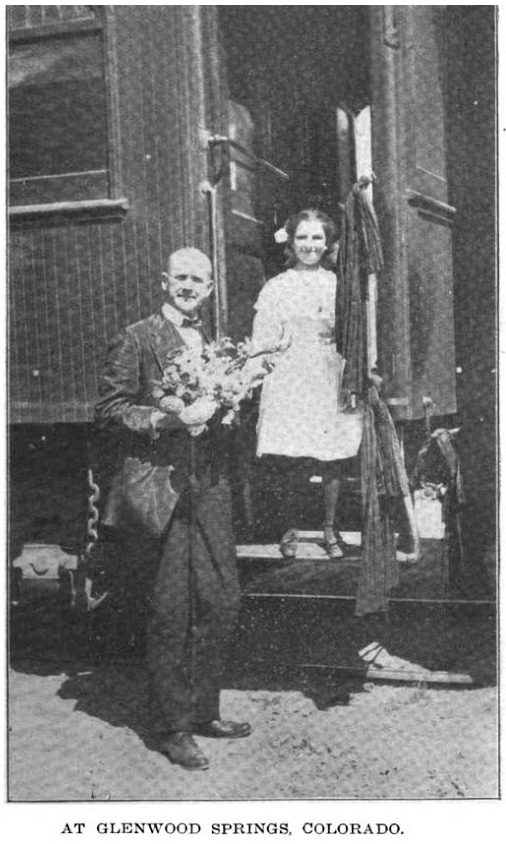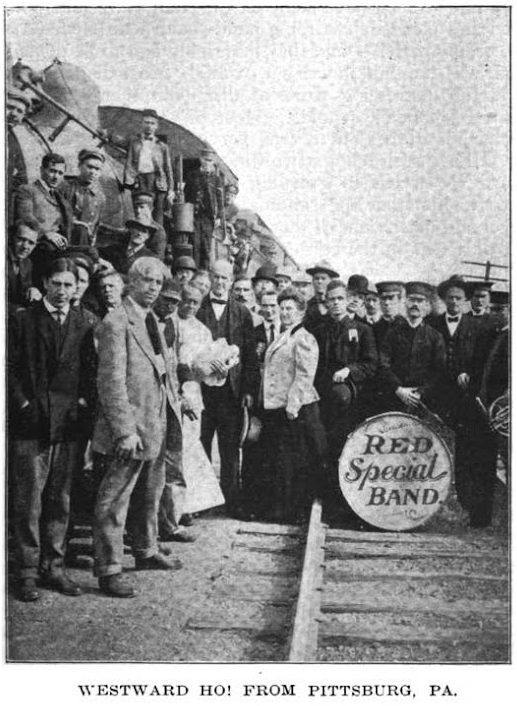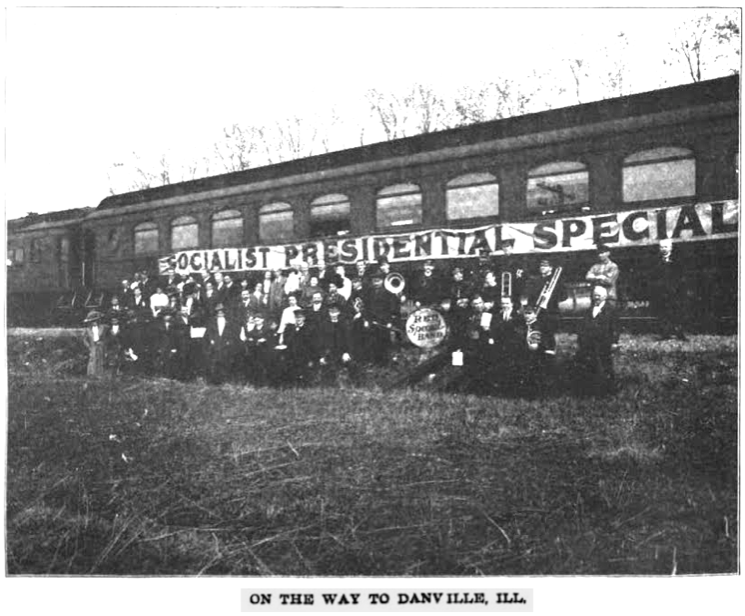
~~~~~~~~~~~~~~~~~~~~~~~~~~~~~~~~~~~~~~~~~~~~~
Hellraisers Journal – Friday December 4, 1908
The Journey of Red Special as Told by Charles Lapworth
In this month’s edition of the Review, Comrade Lapworth tells the inspirational story of the journey of the Red Special which carried Eugene Debs, the presidential candidate of the Socialist Party of America, across the nation, ending with a big rally and last campaign speech at Terre Haute.
From the International Socialist Review of December 1908:
The Debs Red Special
“The Tour of the Red Special” by Charles Lapworth
HE RED SPECIAL was an inspiration; just an inspiration. I am told that the idea was conceived by National Secretary Barnes, and that when this child of his brain was brought forth, and as he nursed it for a night or two and saw its promising growth, he was as much embarrassed by it as any bachelor would be with a baby on his hands.
And then he took his trouble to the National Committee. As the blushing, but pardonably proud, father came before them, it is said that these eminently respectable gentlemen coughed uncomfortably behind their hands, and said “ahem” a good many times; but at last agreed, not without misgiving and foreboding, to stand sponsor to the thing.
Some genius—I believe it was Comrade Simons,—dubbed it the “Red Special.” Out of the goodness of their souls, and of course out of their purses also, the comrades of the whole country were asked to contribute to the child’s maintenance, and—well, I understand so much money was subscribed that it has forever dispelled anxiety about providing for the next addition to the family—the “Red Regular.”
* * * *
That was a memorable day when the Red Special was taken for a try-out to Lemont Park. Unprecedented enthusiasm had been aroused and the people of Chicago poured out in their thousands to give the train a hearty send-off on its twice-across-the-continent trip. The Presidential candidate, Eugene V. Debs, made a great speech, which allayed any fear there might be that he could not talk politics. And Governor-yet-to-be Brower put in some slashing work.
But that was a picnic crowd. We had yet to hit up against the cold callosity of that awfully long list of places on the map that we were scheduled to visit; where the farmers lived, and the miners lived, and the other workingmen lived, amid so much Republican prosperity, all of whom most likely would laugh at us for our pains in talking about the need for a revolution in our social and economic system. And so we were a little nervous when we started out on the morrow. But in the very first day’s meetings we got amongst miners out of work; and they gave us a hearty welcome. They could give us very little financial support; but they gave us their hands, and we went on our way strengthened. And even the stolid farmers got interested. So that by the time we got to Davenport, had “processioned” the town, and Debs and Brower and Simons had stirred up a big meeting to enthusiasm—we felt the Red Special was marked out for success. By the evening of the second day the last doubt had left us. We had got to the other extreme: we were just a little frightened at our own success.
Des Moines, Kansas City and Omaha gave us enormous paid admission meetings, Leavenworth and St. Joe received us royally; and we had not the slightest doubt but that the train would go right ahead and rip the old parties up the back and front.
And then—we got a telegram from the National Office The effect of this telegram was that as subscriptions had fallen off, the Eastern Trip of the Red Special was out of the question; that the Train must go to the sheds on its return to Chicago on September 26. That kinder hit us where we lived. There was a hurry-up meeting called in the chief’s two-by-four stateroom—we sat on each other’s knees—and there we solemnly took oath that “By —-, this thing’s gotter go through to election-day.” The telegraph wire to Chicago showed an astonishing temperature shortly after that. The Red Special crew discussed ways and means for an hour. We were seeing with our own eyes what the Red Special was accomplishing. And we felt confident the comrades all over the country would appreciate that very soon. And sure enough they did. An appeal, hot and marked “urgent”, was sent out from the crew to all the locals in the land. And wherever we had meetings, although the locals had exploited their audiences to the limit in charging admission for a political meeting, the Red Special crew waded in, and exonerating the local comrades, exploited the Democrats and Republicans for a collection. We put it up to the boys of the West to give the boys of the East a chance to see the Red Special. And did’nt they just throw in those big silver dollars, kerplunk? We said “Please give an ocular demonstration of whence the Socialist Party gets its campaign funds.” And they did thus. And the committee at headquarters were comforted. And the trip East was assured.
* * * *
We had started out amid great enthusiasm, and wherever we went the enthusiasm was the same, only more so. After a great meeting at Denver we climbed and climbed the mountains until we got to Leadville, where at an altitude of 11,500 feet we hit up against what the Americans call, I believe, a tough proposition. Although it is so high up on the map Leadville is about as low down as it can possibly get morally and economically. Unemployment we found to be a chronic state of things, and the busiest places seemed to be the saloons and the flaunting redlight district. It made one’s heart sick. There was very good reason for the flaring motto that smote me between the eyes when I entered the newspaper office—”Smile, damn you!”—for every body, even in the open-air meeting that we had, at a corner, where the four winds met, seemed unutterably miserable. Before Gene got through with his speech he had kindled a few sparks in the hearts of his hearers—but Leadville was a sad experience.
At Glenwood Springs we stayed long enough for a useful meeting among the plutes, with the Mayor presiding, and in order to boil the candidate in the natural hot springs in the mountain caves. While we were lunching on the train, in tripped a dainty little maid of about ten years, announcing that she was from Terre Haute, to present Gene with a beautiful bunch of flowers. And this set the fashion. For ever afterwards on the Western trip—flowers and fruits are rare in the East—the train was embarrassed by the mountains of fruit and flowers that were brought in by Socialist daughters and dames.
We were late when we got to the City of the Mormons. Ogden was scheduled to have a noon-hour meeting before Salt Lake City had its Labor Day demonstration. Our tardy arrival was the cause of a dickens of a shindy between the two locals. Between the two sets of representatives, it looked as if Debs would be divided, and so one or two of our heavyweights had to sail in and cause the enthusiasts to break away. No blood was spilt, no bones were broken, and very little moral and intellectual damage was sustained; but we hope that Ogden and Salt Lake City are going to live happily ever afterwards.
We left immediately after the night meeting at Salt Lake City, and struck the new trail across the desert to California. We were to reach Las Vegas in twelve hours. For two days our hearts had been heavy within us,—we had been told by travellers and railroad men that Las Vegas was the hottest place outside of Hades. But, lo! the fates were with us. On the evening before we crossed those arid wastes there had been a surprising down-pour of rain, with the result that instead of the temperature at Las Vegas being 128 degrees as on the day previous, it was but 94 on our arrival. We had a warm meeting there.
Then we were off for California. We are never likely to forget passing through those beautiful mountains and valleys, during the sunset and the twilight. Words can convey no idea of it, and so it’s no use talking. We had a great welcome at San Bernardino. The local comrades had put their all upon the altar, and it turned up trumps. The metaphor’s mixed, but so were the feelings of the Democrats and the Republicans when they caught sight of that parade, and saw the crowded hall—paid admission, mark you!—and heard how much collection respect able “Sanbadoo” had put up for the spread of “these pernicious Socialist doctrines.”
“Sanbadoo” struck the keynote for California. At San Diego was that never-to-be-forgotten open air meeting, where 14,000 people assembled—and paid, mark you!—to hear Austin Adams and A. M. Simons and Eugene Debs. And they all did hear. For the open-air acoustics of that natural amphitheatre were perfect. Los Angeles and San Francisco followed suit with enormous gatherings and great collections for the Red Special, so that Manager Harry Parker had to be provided with a body guard to escort him and his precious burden to the train. At the University of California at Berkeley, there was a mild “divar-shun” by the questions asked the candidate by an evidently sincere inquirer. “But if these things are against the Constitution, what do you propose to do about it?” asked the gentleman. Of course, that was dead easy. “Why, just abolish the Constitution,” said Gene with a smile. And that great crowd in the Greek Theatre just opened their heads wide in appreciation.
* * * *
The personality of Eugene V. Debs was a considerable factor in the campaign. From being the most maligned man in the country he is to-day the most loved. A book could be filled with the pathetic incidents that occurred of the people’s devotion to this man. Many a time we had literally to fight to get him out of the roughly-tender hands of the crowds. We have almost despised ourselves when doing it, as we have caught sight of many a young face—aye, and many a time-seared face—with that inexpressible ardour and zeal and affection in their eyes-the spirit of the enthusiast without which revolutions could never be. Many were content if they could only get near enough to Gene to touch him. These were anxious times for the “brother’s keepers”, because Gene was as eager as the comrades to fraternize. But while their minds were harassed by their responsibility, their hearts were gladdened that the man who had been so long persecuted was at last coming into his own. The American movement is indeed fortunate in its candidate.
I remember talking to a man out West—a middle-aged man of business, with a family, and not an irresponsible fanatic. He carried on his hip an automatic Colt, and almost blushed to confess that he still carried a gun. He had carried one ever since the days when a gun was a necessary article of wearing apparel; and I suppose if he were to go without it now he would most likely catch cold. This man’s love for Debs was a passion. We were talking about the many leaders of the people who had been maltreated by capitalist thugs, and this man of the West said, “I often feel that some day they will do something to Gene. They are more afraid of him now than ever.” With his teeth almost clenched, and placing his hand significantly on his hip, he added, “But, by God, the man who hurts Gene, wherever he be, has got to answer to me personally!” And I believed him.
We had to save Debs from his friends. When he was not dictating to his long-suffering Brother Theodore, or speaking, he was ordered rest, and his stateroom door was locked. Hundreds of men and women have come on the train at various points, and begged and pleaded just for a hand-shake with Gene—”Nothing more, on my oath!”—and they invariably had to be denied. This indeed, was the “unkindest cut of all.” Most of us shrank from it, and the distressing work of disappointment these comrades fell upon Stephen Reynolds. Most of the applicants took their medicine manfully; but it was very, very hard, and very, very bitter. I have seen many a workingman, who had perhaps looked forward for weeks to grasping Gene’s hand, when it was explained to him that the candidate was resting, swing round on his heel and march out of that car, with perhaps only the faintest touch of a tear in the corner of his eye to indicate how much it cost him.
One old man—I believe it was at Grand Junction—had come many miles to greet the candidate. When he arrived at the train Gene was sleeping prior to the evening meeting, and it was not until after the meeting, and Gene had got back to the Pullman, that the old man caught him alone. And there, between the double row of bunks, these two great souls put their arms about each other; and the old man, with tears trickling on to his white beard, told Gene how long he had loved him from afar. I was busy at the other end of the car, but I got out—I just couldn’t stand it.
* * * *
We were sorry to have to part with Comrade Simons at Frisco. Then we hauled on board Harry McKee. Simons had been general utility man so far as managing the day meetings concerned. He was on a beggage wagon and barking before the brakes of the train had done squeaking. Tabloid talks were the order of the day, with a band concert thrown in; and therefore we were a little anxious when our hustler had to leave us. But bless your life, Harry McKee had only to take a couple of bites, and then he came up smiling; and for ever afterwards he could not be suppressed.
Those were splendid meetings at Portland and Seattle; and indeed all the way up the Pacific Coast. It was nothing unusual on the day stops for a town to close up stores and come down en masse to the depot. You see, a Presidential candidate, alive and very much kicking, did not come their way every day. And what do you think of Everett’s effort? Thousands of people crowded into a hall for a meeting in the wee sma’ hours of the morn. Why, it was like a religious revival, where I understand they always sing “We won’t go home till morning.”
Soon we were in the mining districts that have been making history during recent years. Wardner and Wallace had great day meetings. There is no half-heartedness about those miners, I tell you; and America will hear from them again before very long. At Mullan, Idaho, we had to leave McKee, and our hearts were sore; but we left him among friends in those mountain wilds.
Then we had trouble with Hill’s railroad, and our train was delayed hours. Instead of reaching Missoula, Montana, in the afternoon, it was pitch dark at night before we got there; and then we wondered what we were up against. The people were at the depot in thousands, and it was so dark that we could not see the edge of the crowd. They were keeping the red flag flying in very deed. We are never likely to forget the man with the red flag. It was about as big as he could manage; but there was a look in his eyes and in his moustache that boded ill for any man rash enough to touch that flag.
* * * *
Now there had been a strike at Butte. The Red Special was due there for a night meeting. The presence of the Red Special and of Eugene Debs was undesirable—from the capitalist point of view. And the Red Special just didn’t get to Butte until six o’clock next morning. The local comrades, however, held the fort until after midnight, and demonstrated that the Socialist movement is not necessarily a one man show.
Sheridan and Billings were visited, and then we had one of the finest meetings of the campaign at Lead, where Comrade Freeman Knowles, much persecuted by the capitalists and much beloved by the comrades, was paid a glowing tribute by Eugene Debs. In Minnesota we had Beecher Moore aboard as a speaker. Right along we had nothing but enthusiastic gatherings, and the work of the young farmers out in that country and South Dakota is something to make note of. St. Paul, Duluth, Hancock and Green Bay, and a full day at Manitowoc, before we got back to Chicago, made us tired—but it was “fair champion,” as the Yorkshireman would say.
* * * *
And by the way, I must just express my admiration of the oratory of Eugene Debs. It was perfect in every respect. He said the right things in the right way, and brought home to the workingmen in a way I have not seen equalled, their responsibility for the abominable system we are living in to-day. His epigrams ought to be preserved. They took the people off their feet.
And particularly in dealing with the emancipation of woman and of the child slave, was he effective. Here is an instance. He was speaking of the enormous evils of prostitution, and quietly reminding the workingmen that it was the daughters of working men who were found in the Red Light district. He spoke of the many temptations that beset the path of the young girl in the factory and the department store; and said with all the vehemence in his soul:
I want you to understand this. When you go home and look at that bright-eyed girl of yours, that you love more than life itself; when you look deep into the liquid depths of her eyes and see there your own image reflected-I want you to understand, that if it be written in the book of fate that that child of yours shall perish in a brothel, you are responsible if you vote to perpetuate this system.
And a fierce yell, as the roar of a wounded animal, would break from the audience, in full acknowledgement of the truth of that charge.
* * * *
Within two or three hours of our return from the Western trip we were ordered East. Not an hour’s vacation was couchsafed us. And there was very little enthusiasm about the starting of the second trip, although there was a dogged, determined, do-or-die sort of atmosphere on the Red Special. That first day, including even Indianapolis, was rather a depressing one. The meetings were all right, but—everybody seemed to have the idea that everybody was going to get upon everybody else’s nerves. But, bless you, after we left Indianapolis, everything brightened up. Fact was, that it went hard that not a day’s rest was given between trips—and then that Eastern schedule did look formidable, didn’t it?
The wheels of the Red Special were soon running merrily. South Bend with its warm real welcome did well, and on the Sunday there were enormous crowds at Battle Creek and Albion and Jackson. In the evening we were in Detroit, notorious as being the biggest scab town in the States. John Chase was now putting up most pathetic pleas for collecions—and getting the money. He simply told how the boys of the West had put their hands down for the boys of the East, and,—well, the boys of the East didn’t want charity, did they? Not half.
It rained next day, and it was during the rain at Trenton, Illinois [Michigan], that those dear little school children came to visit us, and Gene recited to them Riley’s “Clover,” and told them about the little waifs in the big cities who had never seen a live chicken—just think of that!—and how the Red Special was an effort to make the lives of all children brighter and happier—and all that loving talk that only Gene can talk; talk that touched the hearts of those ruddy-faced children, and moistened the eyes of the up-grown onlookers.
At Toledo we were officially met by Brand Whitlock, mayor of the city, upon whose shoulders seems to have fallen the mantle of Golden Rule Jones; and whose logical next step should be on to the Socialist platform. Toledo simply overflowed into several meetings that night. Cleveland filled its vast armory—paid admission, mark you!—and Erie and Buffalo and Rochester and Syracuse did ditto repeato. Coming down New York State, Joshua Wanhope [Joseph Wanhope], candidate for Governor, was a spell-binder; and did so much work with his throat that he could only whisper when he got to the Hippodrome at New York. Leffingwell of Wilshire’s, was also with Comrade Floaten‘s literature lads for several days.
During these latter days we had on the train Mr. Sturdevant [Sturtevant], the genial representative of “The World,” and Collier’s Weekly also had a man abroad. That reminds me that through out the campaign one of the most surprising features has been the attention given the Red Special by the capitalist press. We had nearly always some reporter travelling with us. And scores were served by Publicity McFeely with “dope” about the Socialist campaign. In cities where formerly Debs had been dismissed disdainfully in a dozen lines he had now two or three columns, with spread eagle headers. Papers went to any expense to get interviews and photos. And it must be said that with very few exceptions their reports were remarkably fair. There was a very good reason for that—most of the newspaper men were sympathetic to Socialism, and quite a few were won over entirely by the geniality of Debs and the simple logic of the Socialist speakers.
* * * *
And then the Red Special hit New York City—and the Democrats and the Republicans, and the capitalists and the newspapers, especially the newspapers. Why, the capitalist newspapers were as enthusiastic about it as our own modest journals. But you all know what happened in New York. New York was just New York—and New York rocked that day.
Some of the New Yorkers however were over zealous in their attentions to the candidate, and he got no sleep. The consequence was that he was hardly fit to stand on the following day. That Monday was a busy day, too. Waterbury, Springfield and Worcester, particularly Worcester, are not likely to forget it. Did you ever see Socialists on the warpath? Well, you ought to have been at Worcester’s depot when the Red Special pulled in— late; and Debs almost on the retired list. There was enough heat generated to set the place on fire. The Rev. Elit White will be remembered as an effectual fire extinguisher.
That night the walls of Old Faneuil Hall, Boston, were in danger of falling—the place was packed nigh to bursting—and there were six thousand people in the Square outside. Franklin Wentworth was the chairman, and “Jim” Carey was also a speaker. The time of Gene’s arrival on the platform approached; and the time went by, and still no candidate. The people inside answered the cheers of the people outside, the police between them; and still no candidate. And then about closing time, the heavens were ripped by the shout of the multitude as the candidate’s cab hove into sight. It appeared that the Red Special had been taken away and lost in the labyrinth of tracks away miles up those dark yards, and the cabman couldn’t find the candidate, and the candidate couldn’t find the cabman. That was a gathering. It was appropriate that Gene Debs should stand magnificent where Patrick Henry stood—only the oration of Debs was the heralding of a far greater revolution.
The cities of Concord and Providence and Haverhill and Manchester gave us splendid receptions. At Hartford we had to compete with a parade of soldiers and other curiously dressed persons, who were celebrating the opening of a bridge. But a large crowd preferred hearing Debs to listening to the blare of trumpets, and watching a fools’ parade. They knew that at that very hour, while money was being wasted in profusion and fire works and decorations, there were men out of work in Hartford; that there were starving children in Hartford.
New Haven, Bridgeport and Connecticut generally had meetings which showed great promise for the near future. And then we were away to Trenton, New Jersey and Philadelphia. Quaker City, although just recovering from its Founders Celebrations, simply fell over itself that day. There were three meetings simultaneously in various parts of the city, and the local comrades got it in the neck from their own servants, the police. That was nothing fresh for Philadelphia, but it made some of the crew of the Red Special see red when they witnessed the rough handling of those peaceful demonstrators. At night Camden Theatre was filled to overflowing, and there with us was Comrade Horace Traubel. After the meeting the candidate caught a severe chill, being exposed to a raw night air while driving in an automobile, still perspiring and exhausted from his oratorical efforts.
Next morning, with long faces, we had to announce that Gene was ill abed with a fever. We were as much disappointed as Newark that day. Gene did not rise from his bed until it was time for him to visit the rally that had been arranged in the East Side of New York on the next day. Jee—rewsalem! Wasn’t that a demonstration? Most admirable arrangements had been made by Robert Hunter, and Gene and his escort came through those cheering meetings unscathed. A tribute is due to the police, for their kindness that day. Their conduct was different to what it was when last I happened to be in New York with Robert Hunter—that was the day of Union Square.
Brooklyn spread itself out that evening over two great meetings, and among the speakers were Franklin Wentworth and Alexander Irvine. Jersey City followed suit next evening after Comrade Sadie Walling and the Wilshire Girls had entertained the Red Special Boys at 200 William Street. Reading and Baltimore wondered what had happened when we struck town—great parades and meetings. At Wilmington, Delaware, the train and the candidate again got lost, and Comrade Parker and myself had a sweating time keeping that meeting going, wondering all the time what the deuce had got the candidate. But like the hero always does, Debs arrived just in the nick of time. I can’t mention all those towns where the comrades worked so indefatigably to get together those big demonstrations, but Pittsburg was superb, thanks in no small measure to Comrade Slayton. There the police also interfered, but they were entirely disarmed by the legal suavity of friend Stedman.
* * * *
Seymour Stedman had joined the speaking staff of the train at Pittsburg, and he, poor chap, got up against an open-air over flow meeting for about an hour—and for two days he was simply deadheaded, and treated as a distinguished, or rather as an extinguished, passenger. But when he got into shape,—well, a whirlwind is but a gentle zephyr in comparisson. So many big-voiced men were down-and-outed by that outdoor speaking in competition with railroad engines. It was pathetic at Dayton, Ohio, for instance, where Comrade Caldwell was in “my own country”, to hear this croaking raven comparing vocal notes with Stedman in front of a big meeting on a grandstand.
Another disappointment at Columbus, where Ellis O. Jones presided over a splendid gathering—paid admission, mark you!—in competition with two or three other political gatherings. At the last moment before the meeting Gene was again “all in,” and Stevie Reynolds had to step into the breach. Cincinnati was fortunate in having Debs on his feet again next night, however. And they deserved it, for ‘t was a great meeting. At Louisville, Kentucky, we had a meeting at the top of a big hotel, where Comrade Dobbs introduced us to some very select sort of people, who were very much interested in “this Socialism.”
At Evansville we were in competition with William Howard Taft, and we did not come off second best. We had the larger meeting, and the people paid admission at our meeting, mark you! St. Louis filled the new Armory, and provided soldiers to escort us, and see that we were not hurt by the five thousand unfortunates in the overflow meeting outside. Decatur and Hannibal were the next evening stops, and we had then the service of the Rev. J. Stitt Wilson, who had just stepped over from England to spend a few days in the fight. Brower was again with us, and after Galesburg and Streator we finished up strong at Joliet.
Our third trip was commenced next day. After we had fired Milwaukee at three meetings, and had rousing times at Racine and Madison University, we came back to Chicago for that great demonstration, when the twenty thousand did that shouting stunt for thirty minutes—an achievement about which they seemed proud. And then we went to take Gene home to Terre Haute, taking along with us as a special favor, National Secretary Barnes. There were also with us the girls of the National Office, a favor conferred upon us. Moreover there was aboard no less a person than big Bill Haywood. It was very appropriate that he should appear alongside of Debs when he was welcomed to his home city. And that was a welcome, and no mistake. There was very little politics in it so far as Terre Haute was concerned. It was simply the city’s whole hearted tribute to an honored citizen.
* * * *
It was a stupendous achievement, and the American Socialists have every reason to be proud of it. It stirred up the country as no other scheme could have done. The party was brought together over it—it was as a grand parade of the entire Socialist strength of the country. We found the people hungry for education. We found that the strength of Socialism was in the small towns and country places; and there it is that it will be worth while to concentrate propaganda. At any rate the big cities will certainly say that they can take care of themselves. It was a stupendous achievement. And paid for, mark you!
[Emphasis added.]
~~~~~~~~~~~~~~~~~~~~~~
SOURCES
Quote EVD re Red Special, AtR p2, Sept 19, 1908
https://www.newspapers.com/image/67587451
The International Socialist Review, Volume 9
(Chicago, Illinois)
July 1908-June 1909
Charles H. Kerr & Company, 1909
https://books.google.com/books?id=Z6o9AAAAYAAJ
ISR-Dec 1908
“The Tour of the Red Special” by Charles Lapworth
https://play.google.com/books/reader?id=Z6o9AAAAYAAJ&printsec=frontcover&pg=GBS.PA401
Re Trenton at Michigan
Hellraisers Journal: “The Red Special Goes East” -School Children Come Through the Rain to Meet with Comrade Debs
Re Frederic M. Sturtevant & Joseph Wanhope
Hellraisers Journal: From the Montana News: “Red Flags Flying” Debs Met in Buffalo with “Enthusiasm Unrivaled”
IMAGES
EVD Red Special Cover Photo at Danville, ISR p1033, Dec 1908
https://play.google.com/books/reader?id=Z6o9AAAAYAAJ&printsec=frontcover&pg=GBS.PA1033
EVD Red Special Lemont Park near Chg, ISR -402, Dec 1908
https://play.google.com/books/reader?id=Z6o9AAAAYAAJ&printsec=frontcover&pg=GBS.PA402
EVD Red Special Glenwood Springs CO, ISR -405, Dec 1908
https://play.google.com/books/reader?id=Z6o9AAAAYAAJ&printsec=frontcover&pg=GBS.PA405
EVD Red Special Pittsburg PA, ISR -407, Dec 1908
https://play.google.com/books/reader?id=Z6o9AAAAYAAJ&printsec=frontcover&pg=GBS.PA407
EVD Red Special to Danville IL, ISR -410, Dec 1908
https://play.google.com/books/reader?id=Z6o9AAAAYAAJ&printsec=frontcover&pg=GBS.PA410
See also:
Tag: Red Special of 1908
https://weneverforget.org/tag/red-special-of-1908/
“The Tour of the Red Special” by Charles Lapworth
http://www.marxisthistory.org/history/usa/parties/spusa/1908/1200-lapworth-redspecial.pdf
https://archive.org/details/TheTourOfTheRedSpecial1908
https://www.marxists.org/history/usa/parties/spusa/1908/1200-lapworth-redspecial-graphic.pdf
Charles Lapworth
https://en.wikipedia.org/wiki/Charles_Lapworth_(journalist)
~~~~~~~~~~~~~~~~~~~~~~~~~~~~~~~~~~~~~~~~~~~~~

